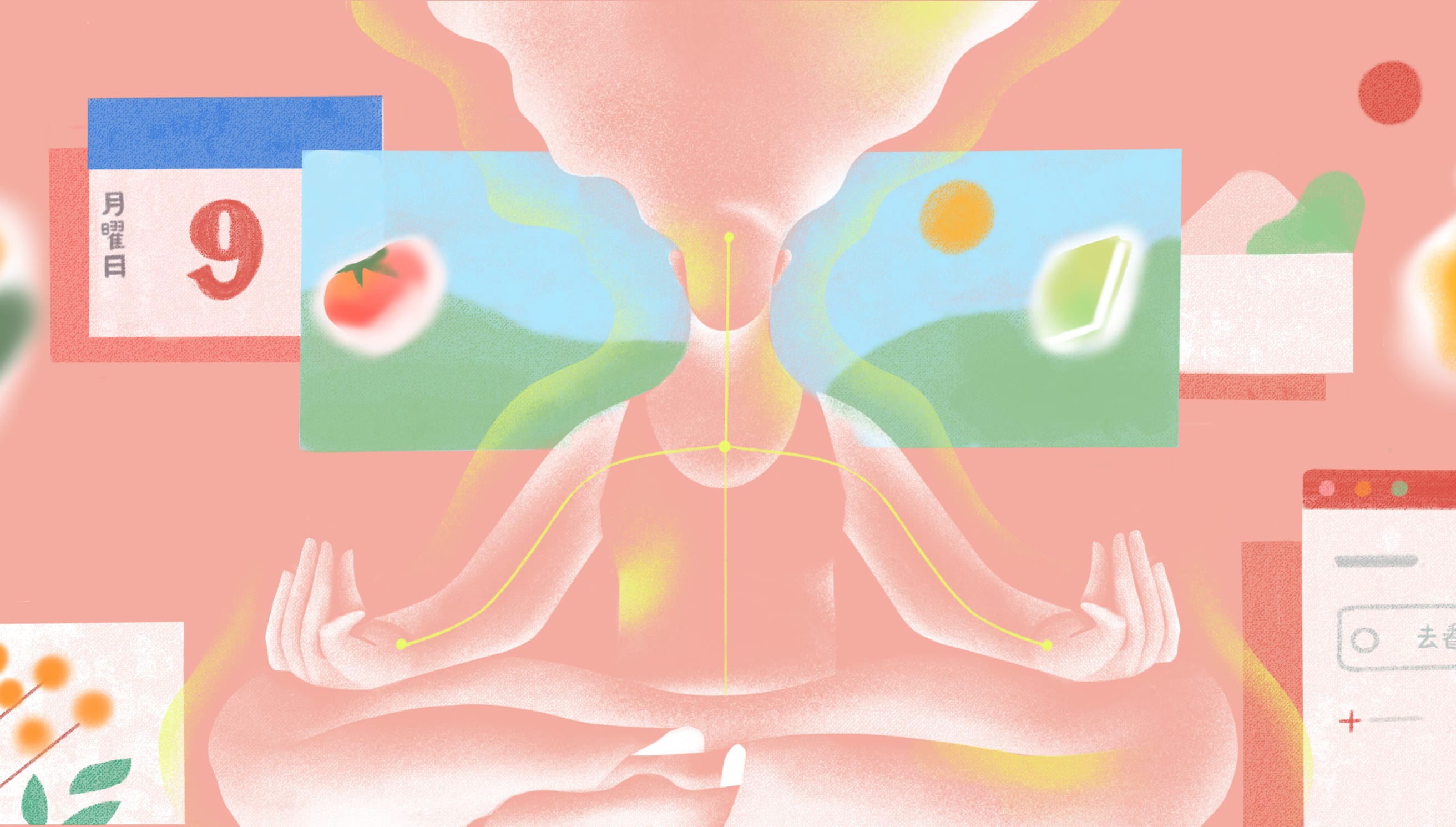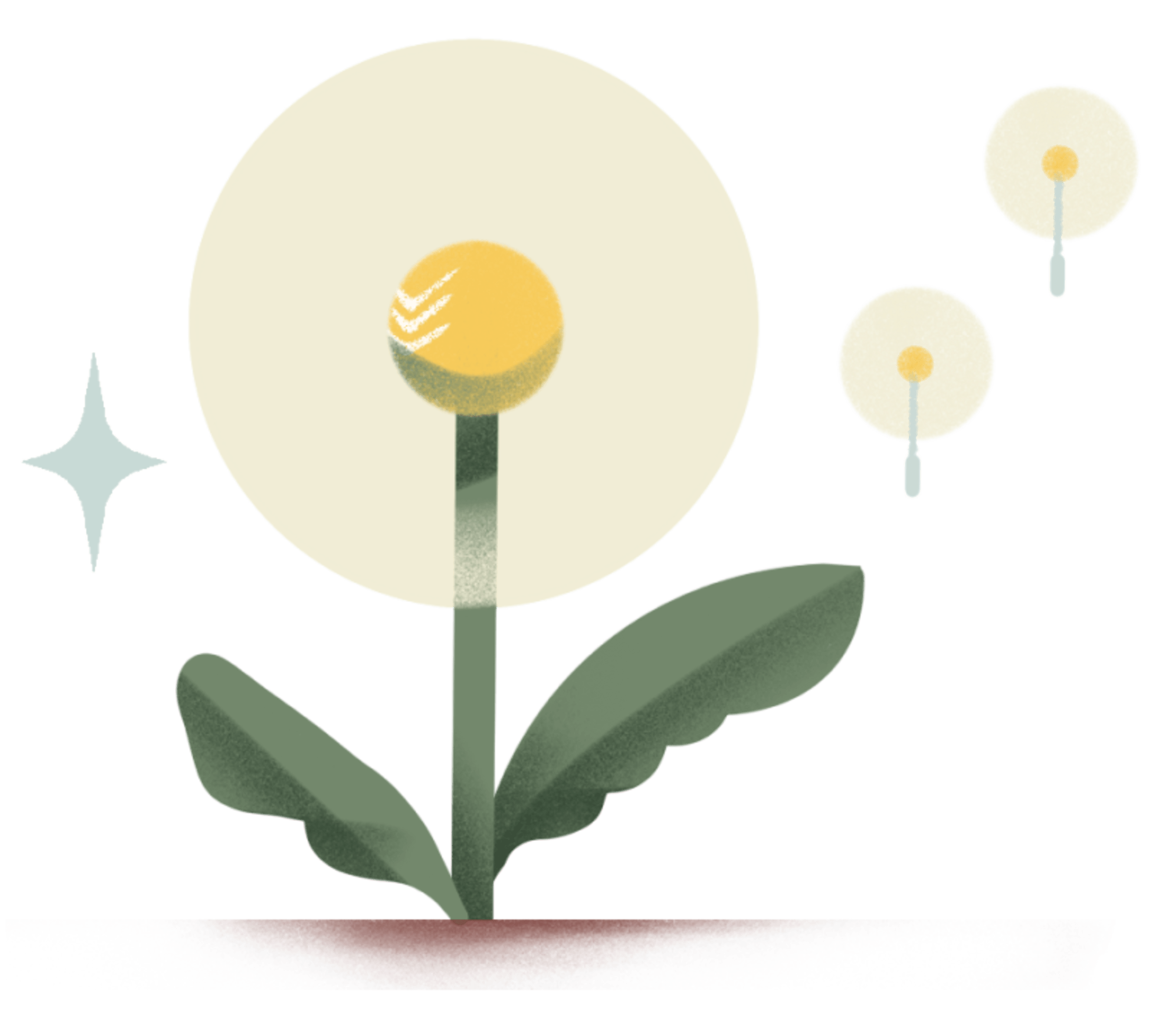Good health doesn't happen by accident. It requires a little planning, occasional checkups, and smart daily decisions. But between succeeding at work, maintaining meaningful relationships, and dealing with the stress of a year that won't quit, it's easy to let our health fall to the wayside.
That's where a digital task manager like Todoist can step in. Building a system to keep track of your health helps ease the mental burden of remembering habits that keep us feeling fit. This guide is here to make tracking and maintaining healthy habits easy so you can get to the good stuff: living your healthiest and happiest life.

Preventative care
As the saying goes, an apple a day keeps the doctor away. But sometimes the proverb needs an edit: a doctor today can keep future problems away.
Monthly self-exams and yearly mammograms can catch breast cancer early. Routine dental cleanings can prevent gum disease. And regular pap smears can detect changes in cervical cells before they turn into cervical cancer.

Here’s how to plant these practices into your normal schedule.
Set recurring tasks
When doctor’s visits, exams, and appointments are too hard to keep track of, it's time to set recurring tasks for each. This is especially important when you need to track your health and the people in your care. Recurring tasks are the easiest way to make sure nothing gets lost in the shuffle.

Here’s a lesser-known Todoist tip: use an exclamation point (!) to ensure your tasks repeat after the right amount of time. For example, Breast exam every! month will automatically reschedule your next breast exam task for a month after you check it off your list. That means that you can do a self-exam every 30 days instead of the 30th day of every month.
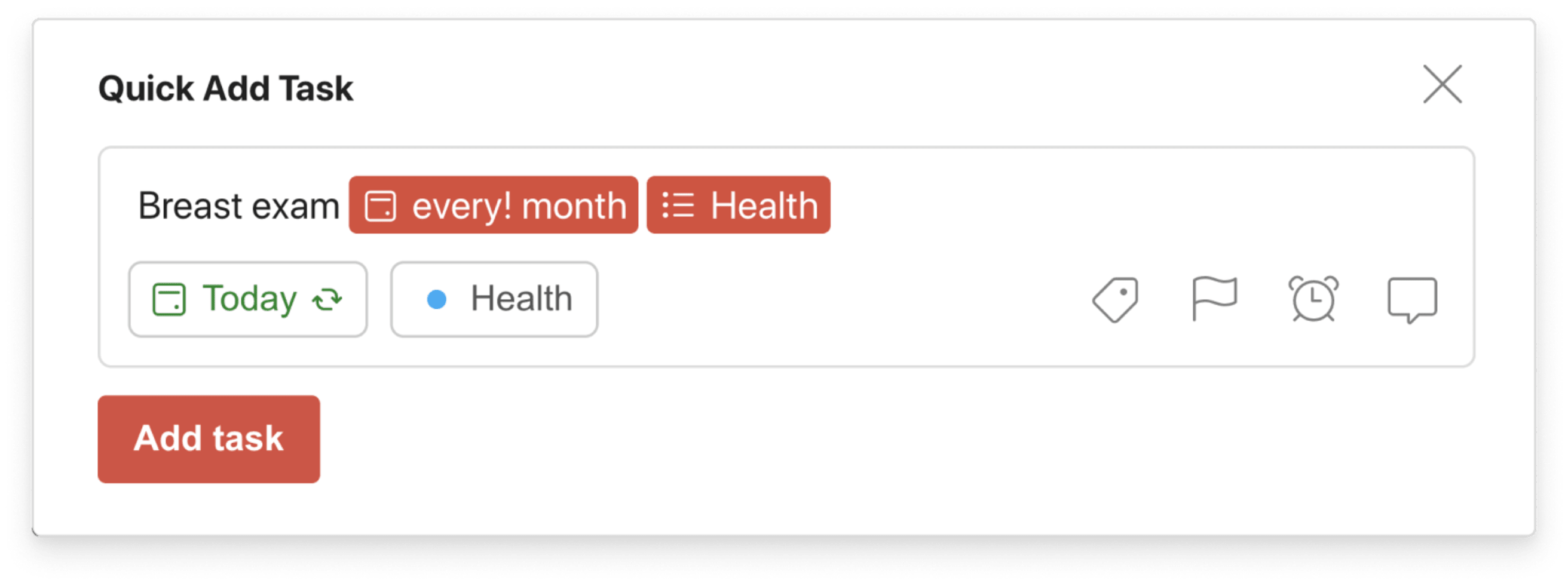
Keep the details in one place
Of course, an avalanche of health-related appointment tasks aren’t super helpful if you don’t arrive on time, in the right place, with all your questions and concerns. Adding the details in the task comments can help you be more efficient and prepared.
- Take notes in the comments of your doctor’s appointments so you can make sure you get answers to all of your questions.
- Add the link to your note-taking app where you're tracking symptoms for easy access.
- Attach the files of the forms you need to fill out before your appointment to streamline the process.
- Paste in a Google Map link into the comments of your doctor's appointment and see an auto-generated map to the doctor’s office appear.

Exercise planning
You’ve signed up for the triathlon of your dreams. But before you can lift your arms and triumphantly stumble across the finish line, there’s the preparation. Rather than hiring a personal trainer or coach, you can build a program based on expert advice and your past experience. But even the best-laid plans often go awry, especially without specific, measurable goals.
Even if a race isn’t in your future, the best way to maintain an exercise program is to do a little prior planning.
Add the whole plan at once
When you find a training plan that feels ambitious but also doable, schedule it out in Todoist. But nobody has time to individually add three months of exercise tasks leading up to race day, do they?
Save yourself the headache by copying and pasting multiple tasks at once. Simply copy the exercise plan you’ve found and paste it into the name of a single task. As long as each training day is on a separate line, the list will auto-convert into a long list of tasks.
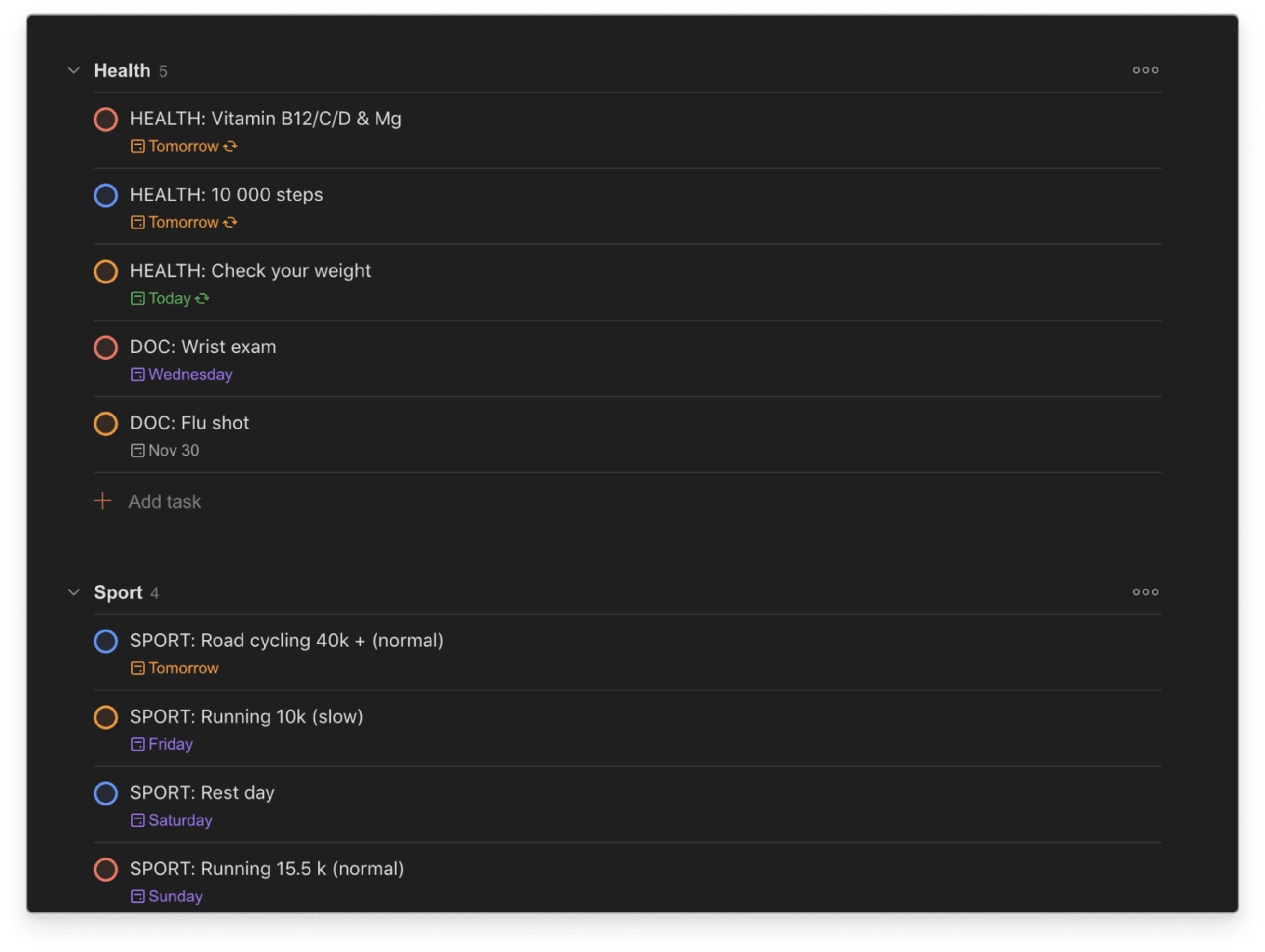
Add your training to your calendar
Once you have your plan added to Todoist, it’s time to set a schedule. Setting aside blocks of time makes your exercise plans feel much less negotiable! Using Todoist’s integration with Google Calendar helps you visualize, organize, and prioritize your workout tasks in your calendar. This real-time, two-way sync between the two means that any changes you make on your Google calendar will instantly be reflected in Todoist and vice versa.
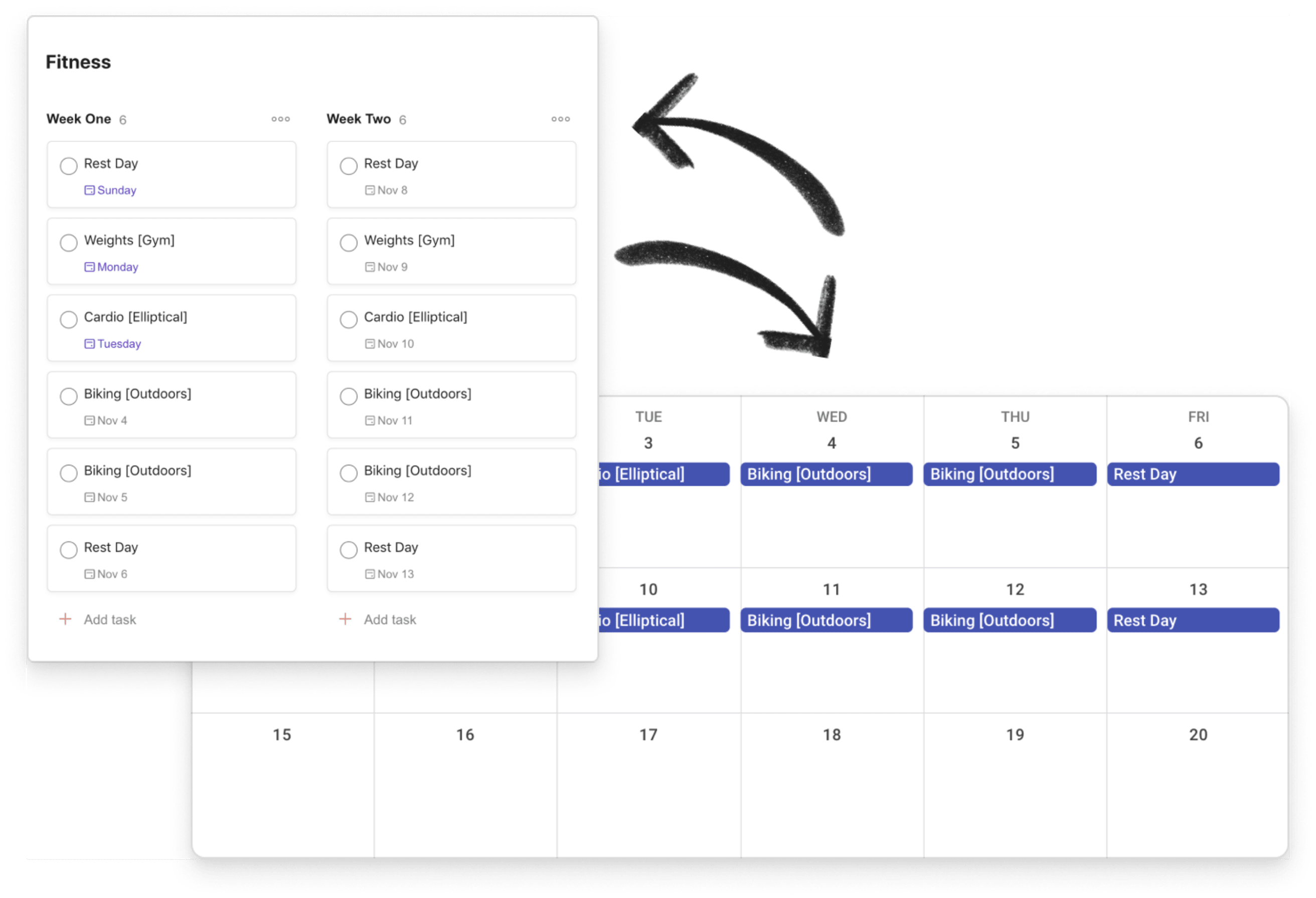
Create a template for each activity
Helmet, jersey, and bike shoes: Check! It’s easier to get out the door for exercise when getting ready takes zero thought.
Create a Todoist template of a packing list for every exercise activity you love to make sure your next race day, backpacking trip, or family bike ride is effortless to pull together. After all, there’s nothing as disappointing as driving to the bouldering gym to find out you’ve forgotten your rock climbing shoes.
Added bonus: Share your templates with friends and family who may want to ride your draft and start exercising themselves.
Medication reminders
When you take medication every day or multiple times a day, it can be hard to remember if you took it this morning before coffee … or was yesterday afternoon after walking the dog? With medications that are only effective when taken at a specific time — like pain medication or antibiotics — a good memory is even more important. Todoist is your brain, just slightly more reliable. Here’s how.
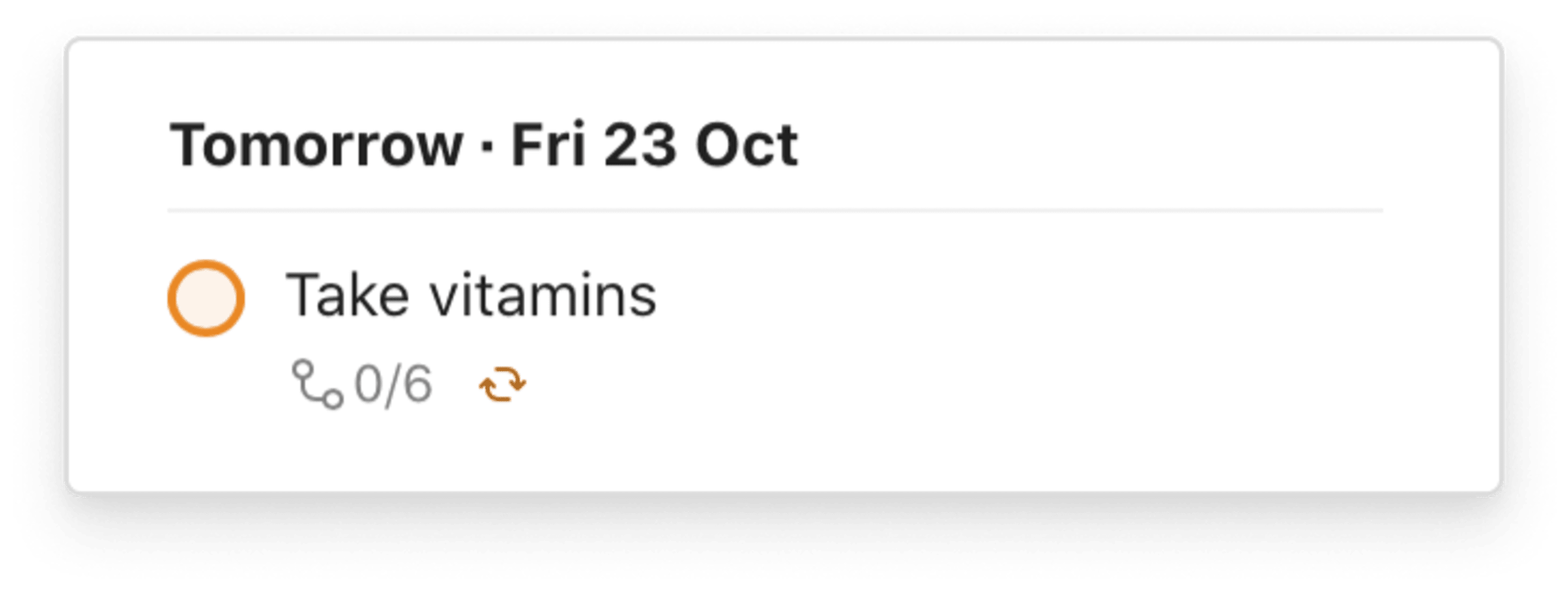
Set reminders
The secret to effortlessly remembering every medication is letting Todoist remember for you. Just click the alarm clock icon when you add a task and select the date and time for your reminder. You’ll also want to customize how you receive these gentle nudges in Settings > Reminders. When it’s time to take your medication, Todoist will send you a push notification or email.
Setting Todoist reminders for 10 am sharp helps Todoist user Bogdan Bujdea remember to take his Vitamin D and Omega 3 every morning. Preventative health measures are just as important as treatment.
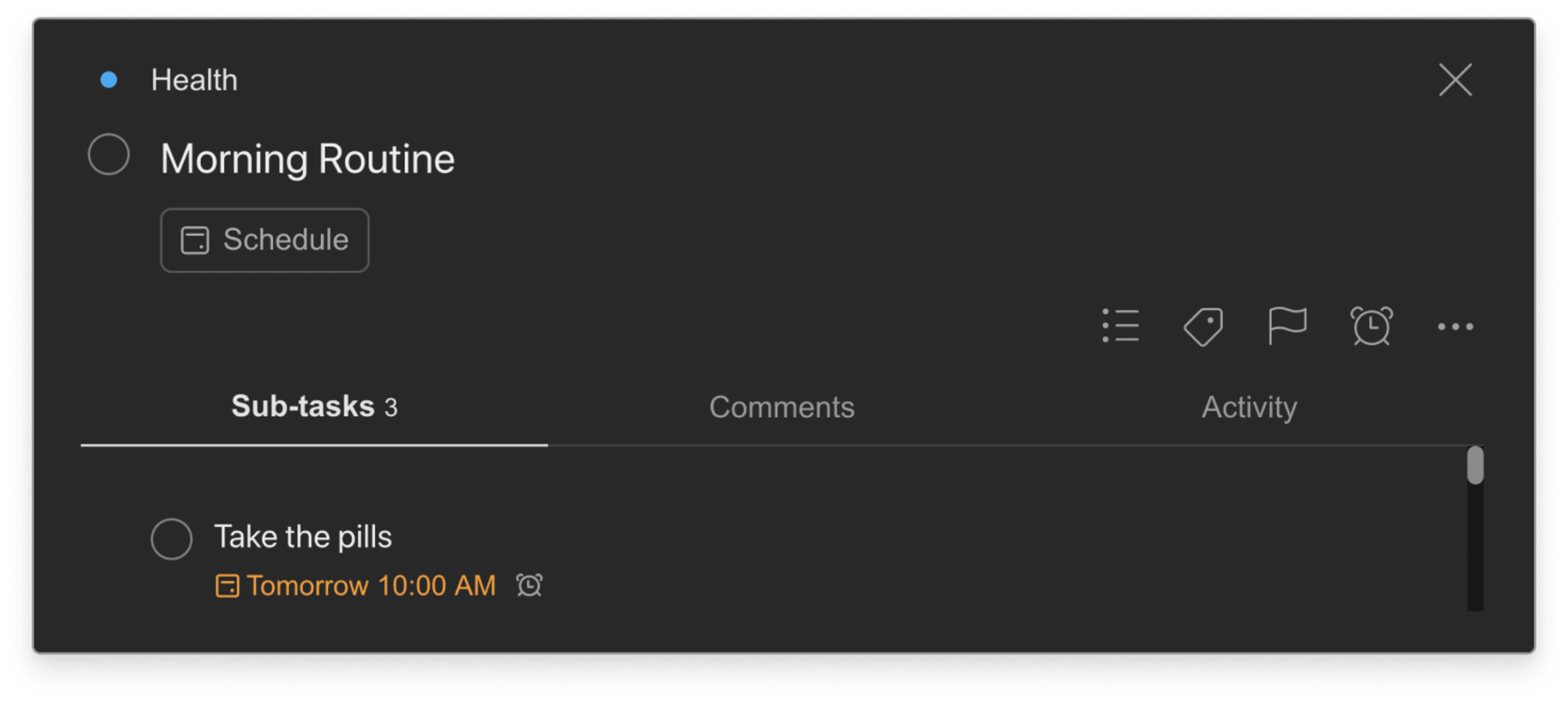
Use completed tasks to keep track
Unsure if you missed a dose? Todoist stores all your completed tasks so you can easily find and search through every single task you’ve checked off — including your medication tasks. If you can’t remember how many times you took your meds this week, just head to your activity log. There, you can find when you completed recurring tasks.
Habit building
“We are what we repeatedly do. Excellence, then, is not an act, but a habit,” wrote philosopher Will Durant. While we might not all be shooting for excellence, day in day out, being a little healthier than we were yesterday is a humble but powerful goal. Unfortunately, habits are hard to build — there’s just so much that can lead us right into our old ways. Use Todoist to turn your health dreams into health goals into health habits.
Break up habits into smaller habits
Big health goals can feel overwhelming — even when it’s something as simple as drinking more water. While setting an ambitious aim is important, small daily (or hourly) actions turn a goal into a reality.
Todoist user Rachelle Bennington stays on track by taking her goal — drinking 72 ounces of water daily — and breaking it up into recurring daily tasks (or sub-tasks) for every glass she drinks. While staying hydrated is an admirable goal, going glass by glass is what makes it approachable and achievable. Plus, each time she checks a glass off her list, she gets more Todoist Karma plus a little bump in confidence.

Use positive reinforcement
Positive reinforcement — often thought of as a canine training method — has been shown to be an extremely effective way to solidify habits in humans too. Positive reinforcement is most effective when it happens quickly, enthusiastically, and frequently.
While completing a task might not seem like much, it’s often the cue to celebrate a job well done. Want even more celebration? Turn on the sound setting in General to get a triumphant noise each time you check something off your list.
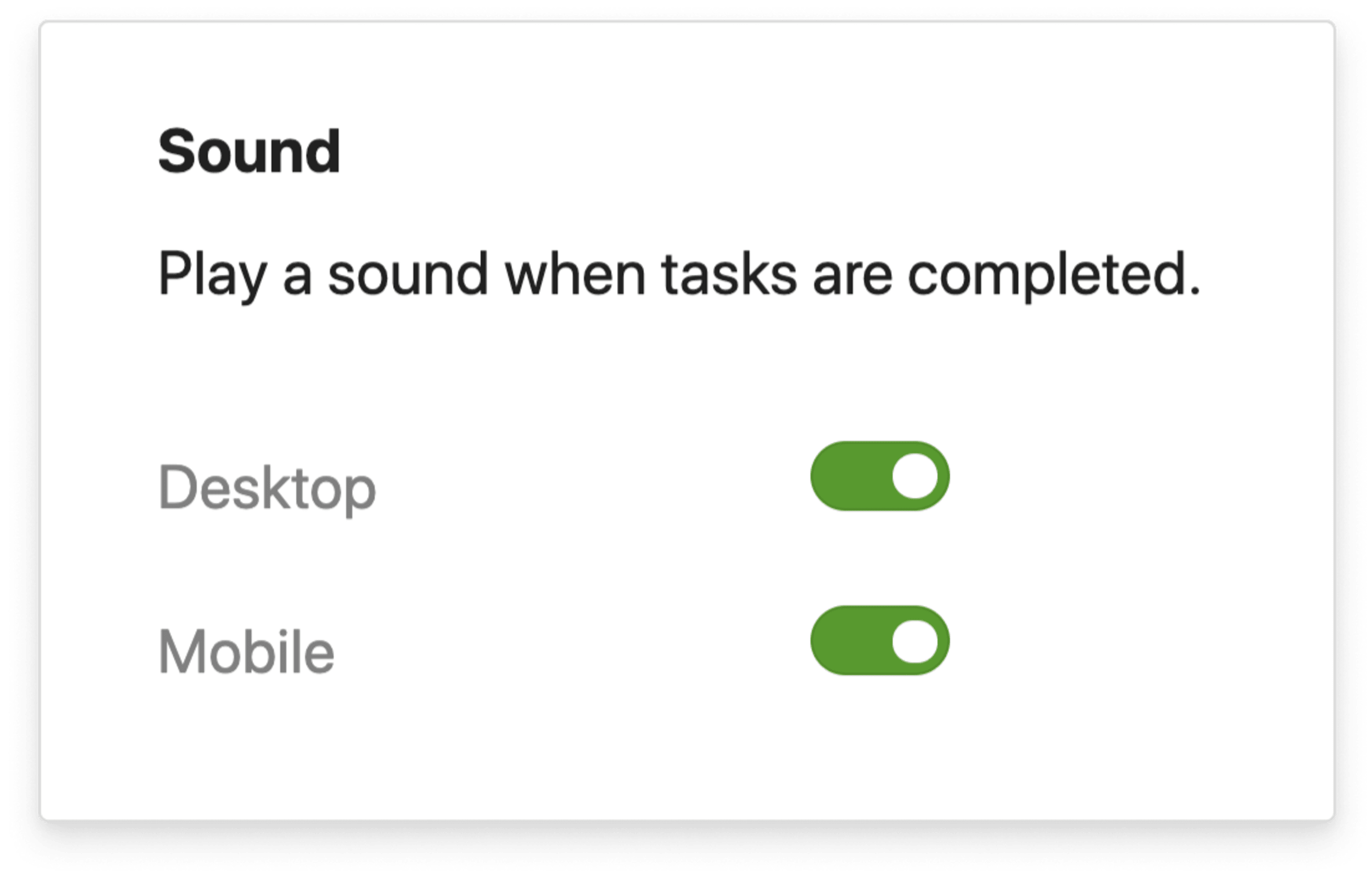
You’ll also get an extra present when you hit major productivity milestones. As you successfully complete tasks on time in Todoist, you’ll gain Karma points and achieve new Karma levels. Don’t forget to pat yourself on the back for these achievements — perhaps they’re the perfect moment to get that new pair of shoes you’ve been eyeing.
Connect your tracking apps
Building habits becomes easier when you track them. Take Jonathan Moy de Vitry, for example. He is a bike courier and innovation consultant who happens to live with attention deficit hyperactivity disorder (ADHD). After his diagnosis, he set about to track his habits and perform minor tweaks to see what could best help him manage his symptoms.
How? By logging variables that affect his symptoms like sleep, eating habits, exercise, and mood. He realized he could automatically add data to Google Sheets each time he completed a Todoist task via Zapier, making it seamless to use Todoist to track his daily habits. Once he began tracking, he started changing one habit at a time and analyzing the results. Through careful study, he found that morning exercise helped him concentrate and get work done later in the day.
Explore all the apps you can connect with Todoist. It’s likely you can connect some of your favorites with Zapier or IFTTT.
Mental health support
Mental health is a crucial part of wellness. Our mental health encompasses not only our psychological wellbeing but our emotional and social wellbeing as well. That means it impacts our thoughts, feelings, and behavior each and every day. It also contributes to how we make decisions, cope with stress, and relate to our loved ones.
What’s more, the National Alliance of Mental Illness (NAMI) states that one in five Americans experience mental health issues each year — which means it is more important than ever to place mental health right alongside physical health in our life.
Just as physical health starts with preventative measures, so does mental health. Here’s how Todoist can help.
Connect with family and friends
Chats over coffee, hugs from parents, and time spent with kids goes a long way in supporting mental health. Unfortunately, people who are lonelier have a greater risk of mental health disorders like depression and anxiety than their non-lonely counterparts.
Despite the ever-increasing number of ways to stay in touch, it can be a challenge to stay connected in a world filled to the brim with always-on productivity and endless commitments. That’s where recurring tasks can help. Setting up a Friends project with repeating tasks to call grandma, text friends, or even follow up on birthdays and important events makes being a good friend or family member much easier.
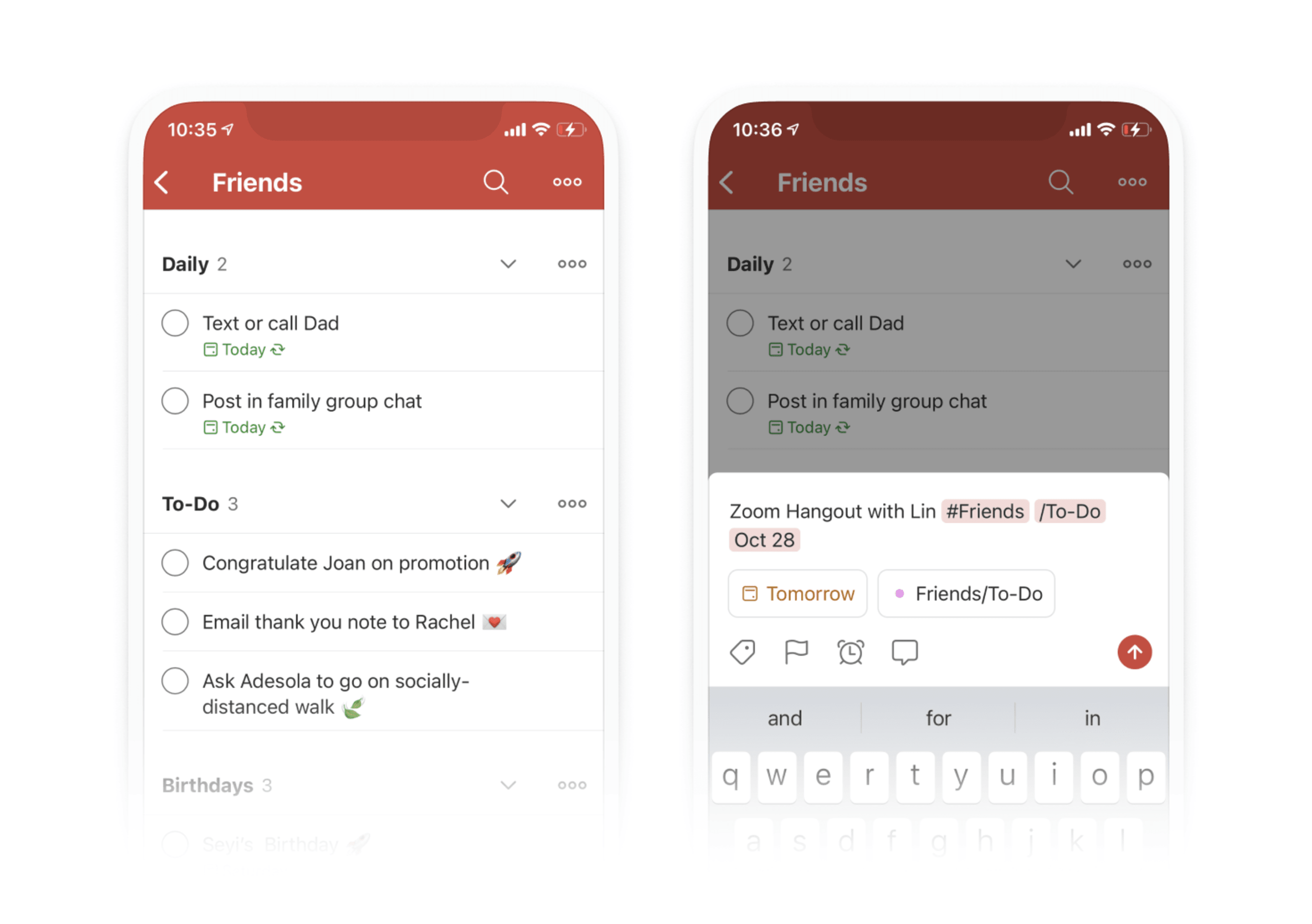
Take regular breaks
Next up on the mental wellbeing checklist? Take regular relaxation breaks. Studies have shown that deep work followed by short breaks is a great way to maintain focus. Just look at the legions of people who love the Pomodoro Technique — 25 minutes of work followed by a 5-minute break.
Remembering to take breaks is challenging. Try Todoist’s integration with Flat Tomato — which syncs your important tasks and automatically reminds you to take breaks so you can manage your work and rest time.
Remember relaxing activities
You might be wondering what you should do on those breaks. While scrolling through Instagram can feel good in the moment, the benefits of taking brief movement breaks have been well-researched. Constant sitting and staring at screens put you at a higher risk of heart disease, diabetes, and depression. Getting up to walk, stretch, dance, or meditate can reduce these negative effects.
Setting a special label for the activities that help you relax can make it far easier to truly take a break. In times of great stress, it can be hard to remember what has worked for you in the past. Start saving yoga, mediation, or exercise videos you want to try with the labels @5min, @10min, @15min, and so forth, depending on the amount of time you have to take a break. Or note down activities that lower your stress levels with the label @destress — like take a walk, journal, or a grounding exercise.
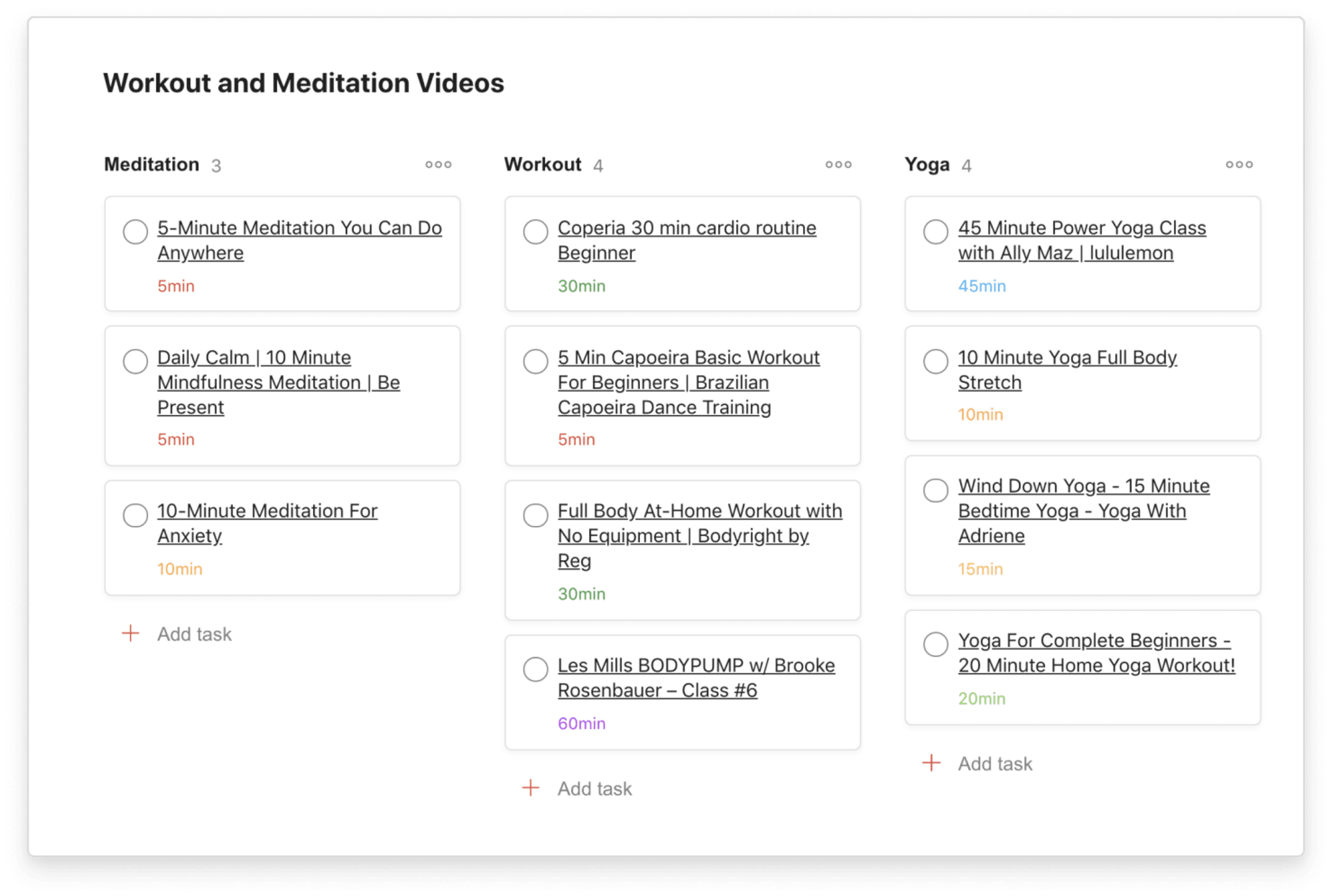
Create projects for mental health tasks
When mental health issues do strike, pre-planned projects are an important tool to weather the storm. Whether that’s a depression checklist specifically designed to remind you to eat and shower in days filled with mental fog or a safety plan for getting through addiction triggers, projects can help you muddle through those low moments.
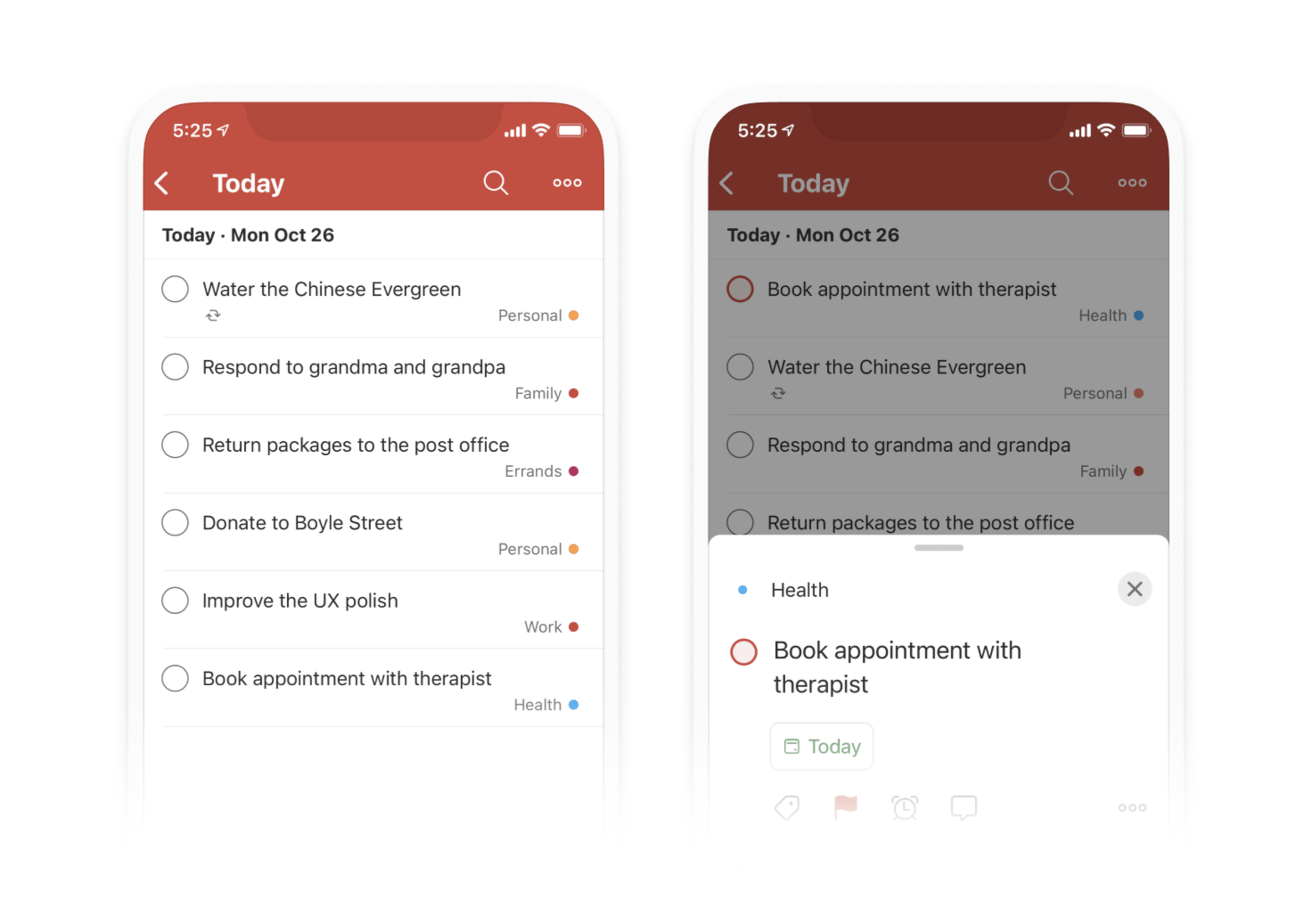
Go a step further by breaking up your mental healthcare projects up into sections, enabling you to organize tasks even further. Try setting up a section for morning, afternoon, and night routines or regular cleaning and self-care tasks.
Nutrition systems
From reducing disease risk to boosting brain function and physical performance, a healthy diet is vital for every aspect of life. But it shouldn’t come as a surprise that creating and maintaining nutritious eating habits can be difficult. With a little prep and planning, you can make good decisions second nature and avoid the trap of quick unhealthy meals.
Visualize your meal plan
A wholesome diet doesn’t happen overnight and certainly doesn’t happen in a single meal. Whether you are cooking for yourself or a large family, planning meals is a good place to start improving your food choices. When you take the time to plan ahead, you can avoid the urge for drive-through dinners.
To begin, make a long list of your favorite meals (you can chat with friends or thumb through a cookbook for help, too). Then you can start arranging and rearranging that lengthy list into just the meals you want to cook for the week ahead.
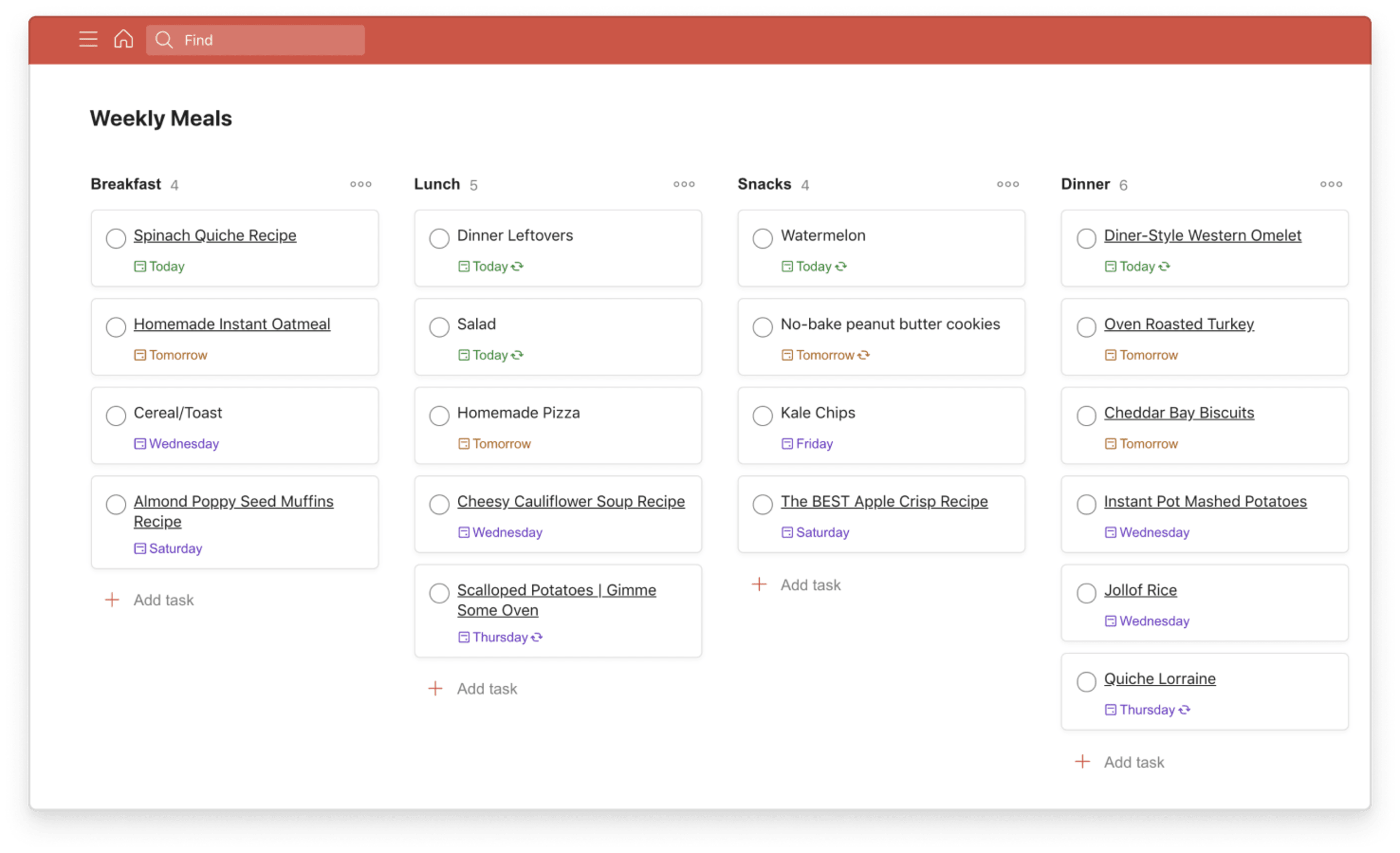
Thanks to Boards view, you can truly visualize your eating plan at a glance — making sure you are getting a good variety of wholesome ingredients and the right amounts of carbs, proteins, and vegetables. Todoist user Oscar B. found Board view made him more conscious of ingredients he’s using as he’s planning his dinners and buying groceries.
Save recipes on the go
Stuck in a rut? It can be so easy to fall back on the same old meals time and time again. If you’re running out of novel eating ideas, it’s time to wander the internet. From the NYT Cooking to good old Pinterest, there are so many places to find flavorful meals.
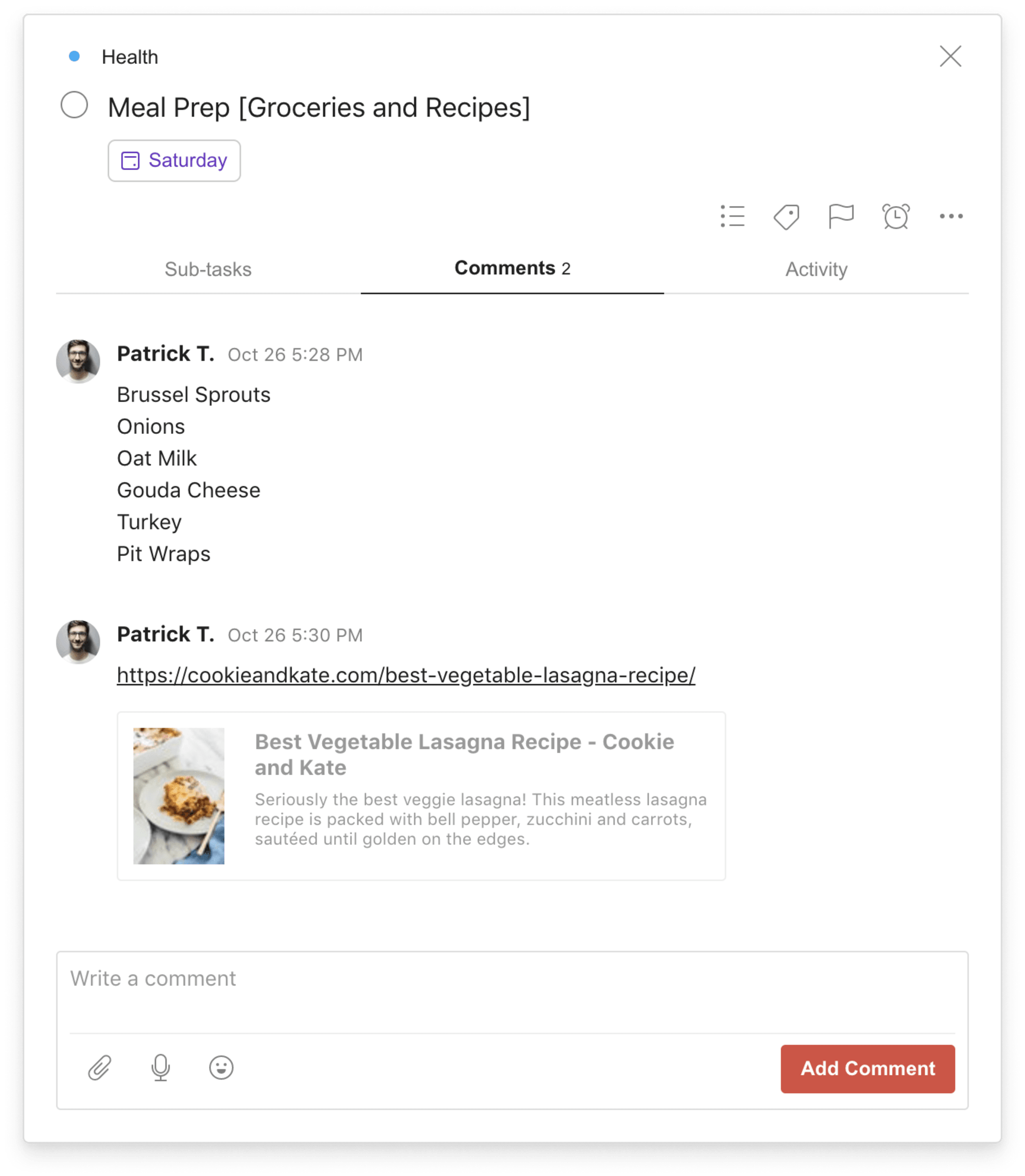
We’re also betting you come across them in a whole host of different sites as you’re multitasking. You can make capturing and saving intriguing recipes a lot easier by installing the Todoist for Chrome integration. Once added to your browser, you can right-click anywhere on a website to save it as a task. What’s best is that the title of the web page becomes the title of your new hyperlinked task so you never have to ponder what you meant when you added it to your recipes project!
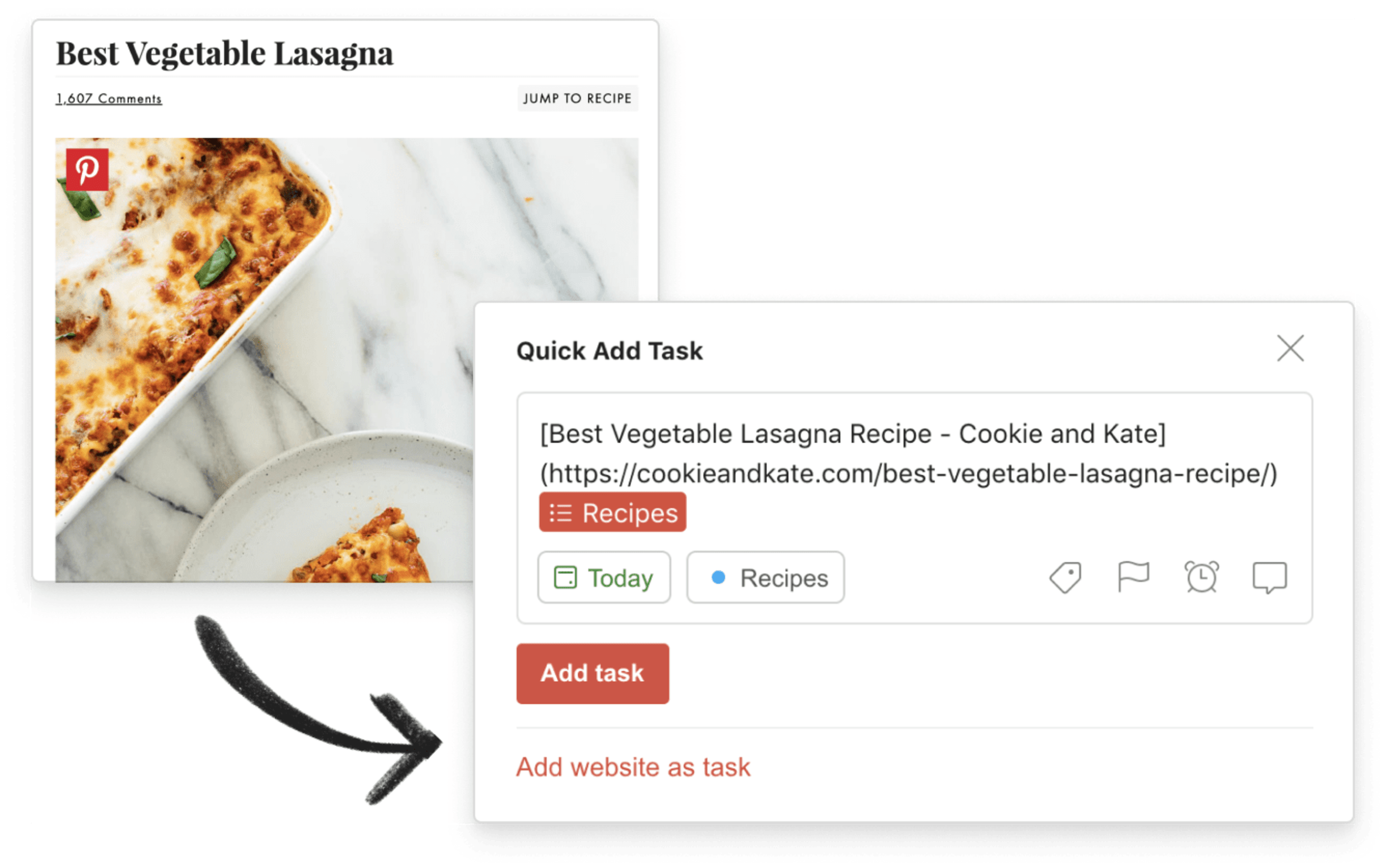
Share your project
Once you have a recipe list and a meal plan, you’ll want to share it with your family or housemates so everyone can contribute. It’s also extremely helpful to create a shared project for groceries to go along with the lists for dreaming up meals and scheduling them. With shared projects, you can even assign tasks to yourself and others so everyone knows what they’re responsible for and no one ever forgets the milk again.
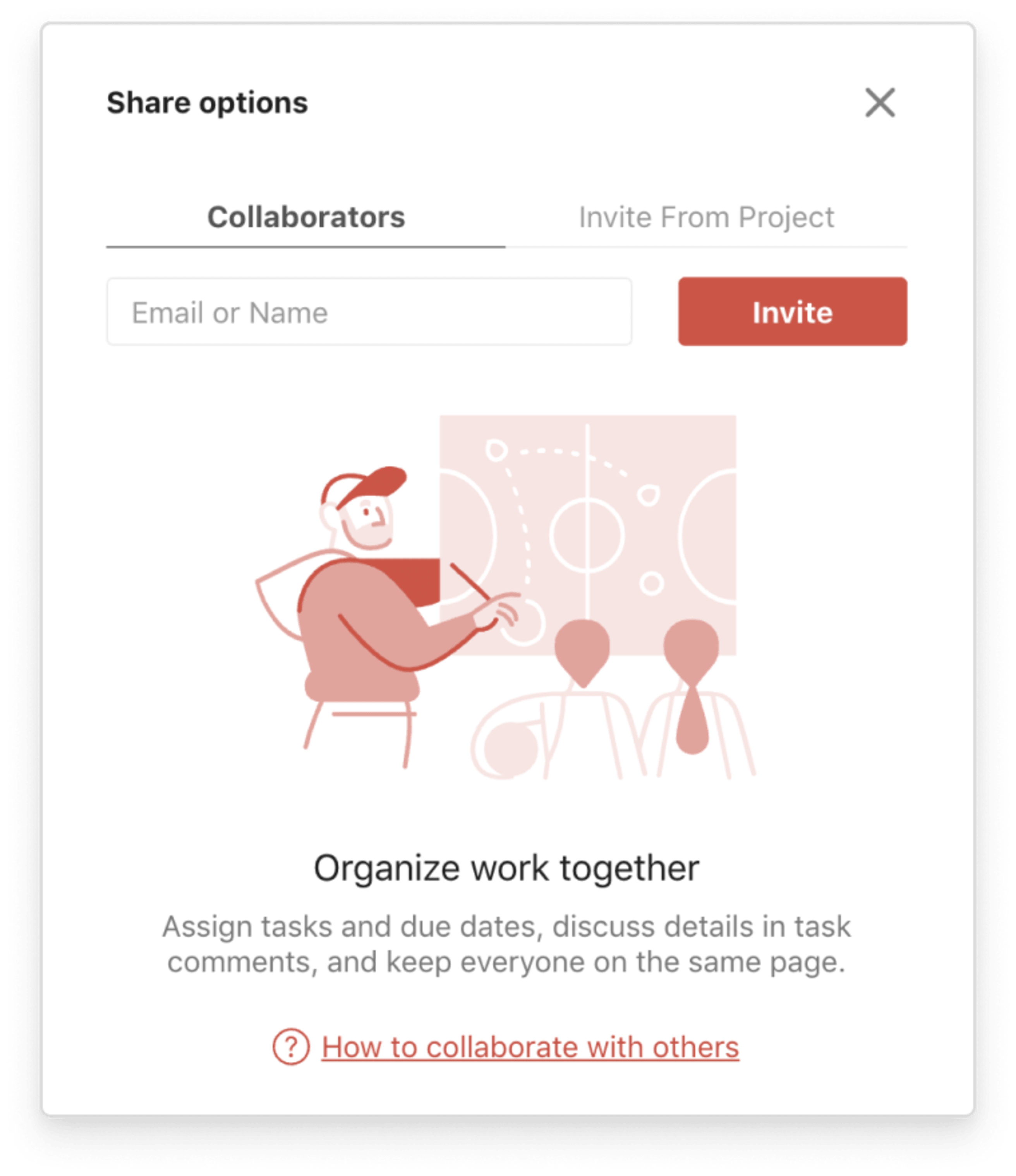
Doist Support Specialist Galina uses a shared Boards project to keep track of weekly meals for herself, her husband, and her new daughter Anna — that way everyone knows what to expect for the week ahead.
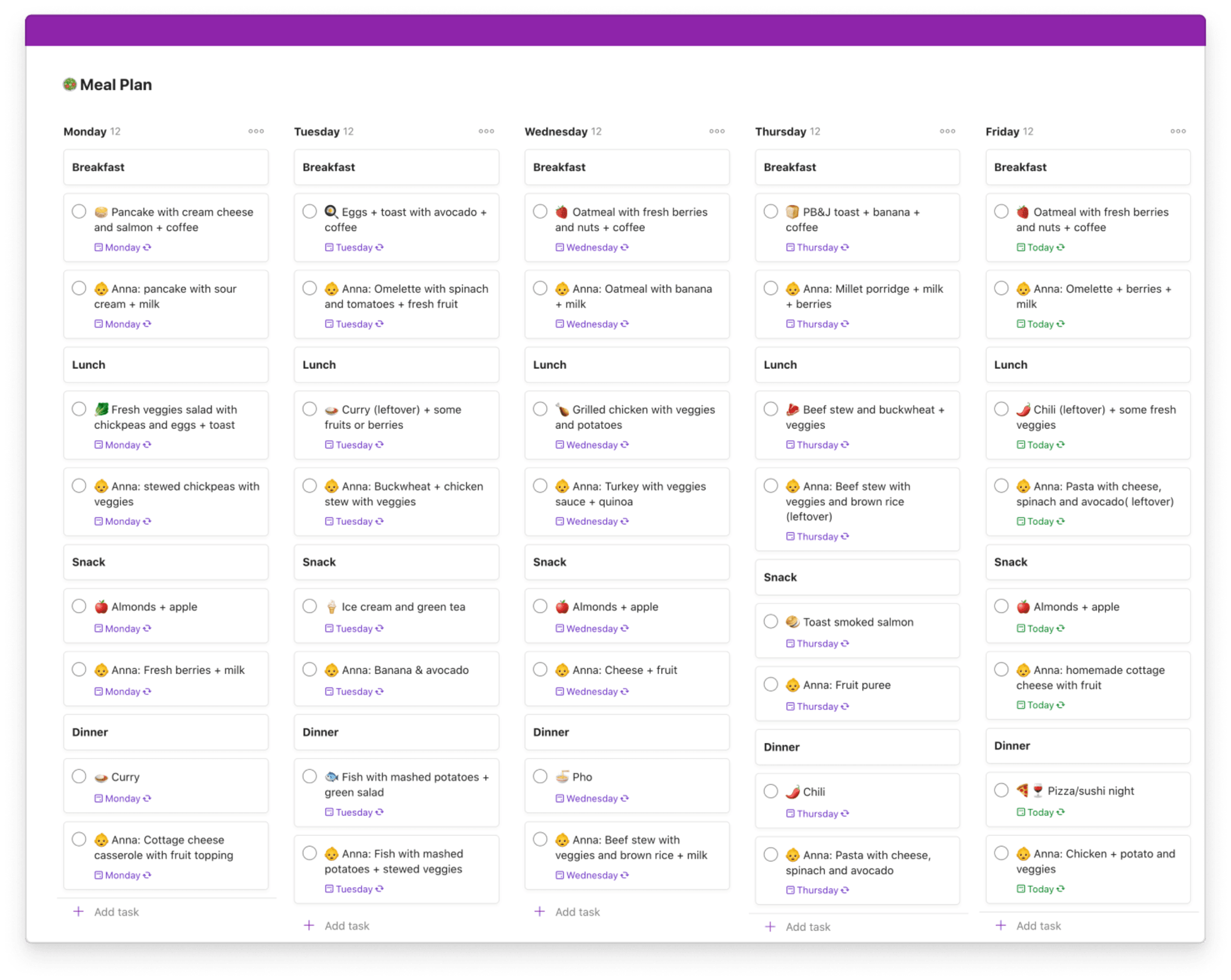
Routine setting
Chase Warrington is the Head of Business Development at Doist. After decades of applying financial advisor David Bach’s advice to pay yourself first — by putting money into investments or savings before paying bills — Chase realized he wasn’t doing the same with his time and energy.
“I was giving my highest energy hours of the day to my external obligations, only seeing what was left over at the end of the day for myself,” Chase wrote. “Usually, it wasn’t much.”
He began routinely prioritizing his own wellbeing before attending to the needs of others. And you can too.
Prioritize your health
Keeping your health top of mind can start small — with just a few high priority tasks you decide to complete each and every day. For Chase, that’s a morning routine of reading for pleasure, enjoying coffee before work, and taking a leisurely walk with his dog. He puts his health first, starting each morning the same way, even if he has a busy day ahead.
Try paying yourself first by setting two or three small non-negotiable recurring health tasks in Todoist. Then mark them as high priority so they’re the first thing you see on your to-do list in the morning.

Keep your health project top of mind
It can also be helpful to see all your health-related projects in a single view at the tippy top of your tasks list. That’s where Todoist’s favorite projects come in.
Separate your highest impact tasks from the low impact to-dos by adding your health projects, labels, and filters to your favorites. For example, add projects like Health or Meal Planning to your Todoist Favorites. That way, they’ll be right under Upcoming view and impossible to forget about.
Todoist user Diltsify, CVT swears by a morning routine to pull health tasks together and putting them first — like remembering to floss, drink water, and express gratitude.
Set a nightly routine
While morning routines are key to starting the day off on the right foot, mornings start the night before. Sleep is probably the single most important factor for your health, happiness, and productivity. And yet, it’s one of the easiest health habits to let slide.
You probably have heard all about the scientifically-backed ways you can improve your sleep, including getting rid of screens before bed, keeping a consistent wake-up time, and setting a bedtime routine. When you do the same series of relaxing habits every night before bed, you’re signaling your body and mind to wind down.
Thanks to Todoist for iOS 14, it’s easier than ever to solidify a nightly routine that helps you slide into a snooze in record time. Try adding a Todoist shortcut to your Wind Down settings in the Health app. That way when your phone starts helping you settle in for the night, you’re able to easily access your end-of-the-day tasks.
Use Upcoming view to take in the week ahead
Studies have shown that to accomplish long-term goals, you need to create an action plan (check!) and visualize carrying it out. Now that you have plenty of healthy routines prioritized, favorited, and at the tip of your fingers, plan ahead.
You can see and organize all your tasks, including your health plans, at a glance in Upcoming view. From there you can start to mentally rehearse any new habits you’re adding to your life — which makes them twice as likely to stick, in some cases. Check on approaching deadlines, rearrange tasks to better fit your schedule, and visualize your health plans for the coming days, weeks, or even months.
See the big picture
Last, but certainly not least, it’s helpful to get a big-picture visualization of the balance of your life. You can do that with Todoist’s Productivity view. To get an idea of which projects you’re working on most, peek at the visual summary of tasks you’ve completed in the last week. By keeping health projects and work projects separated by different project colors, you can get a colorful look at where you’re spending most of your time.
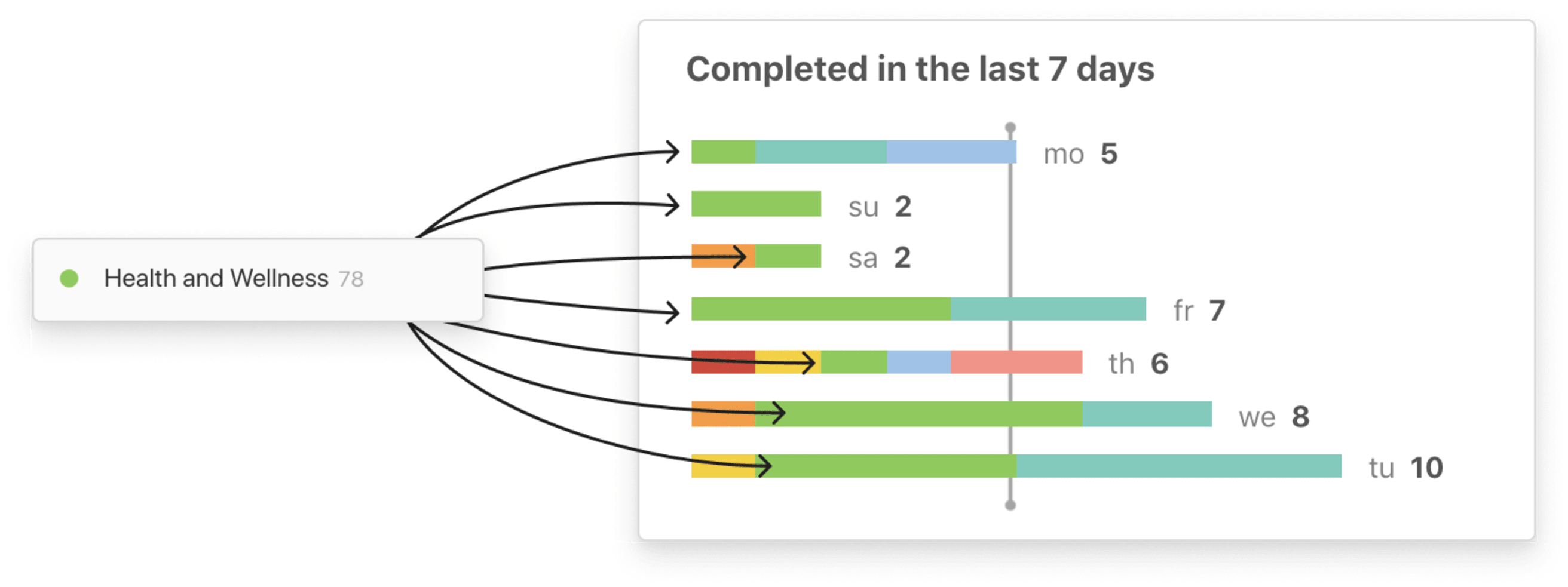
Now that you’ve made it through thousands of words about health, it may seem like a lot of work. Remembering to get checkups, exercise, take medication, eat right, and continually work on healthier habits can feel like never-ending work. However, when you create a system that helps you prioritize your well-being without adding to your mental load, you’ll set yourself up for a well-balanced life.
